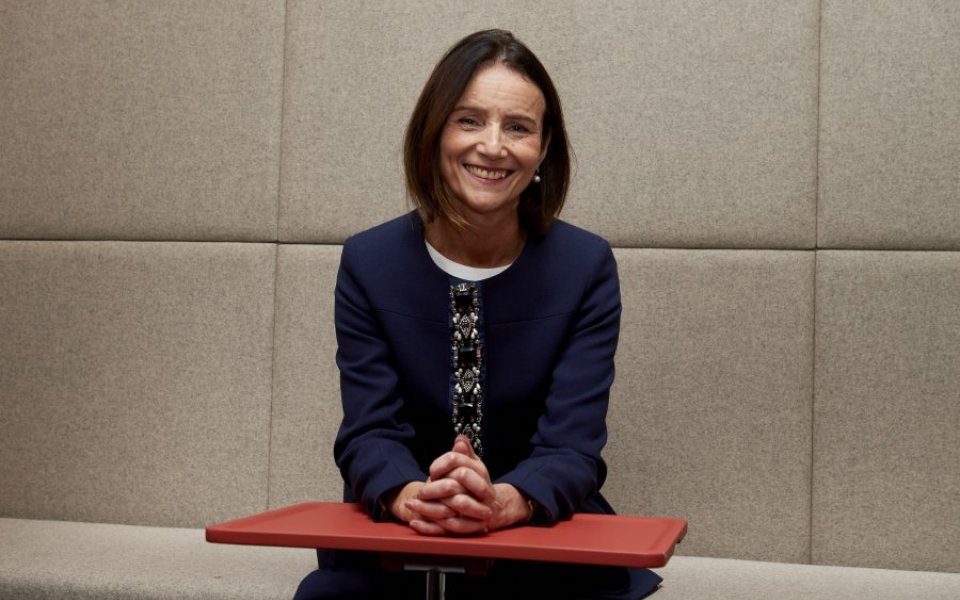New CBI director-general Carolyn Fairbairn takes the reins at Britain’s biggest business group

Speaking to City A.M. at the Confederation of British Industry (CBI) headquarters on Cannon Street last week, Carolyn Fairbairn said that she is “proud” to be the first female director general in the 50-year history of Britain’s biggest business group.
“I think business is a great career for women,” she said. “If my being here could just make some more women think that it’s something they’d like to do, I’d be really happy about that.”
A former director of strategy at both the BBC and ITV, Fairbairn took the reins of the CBI from John Cridland at the beginning of last week.
Having started her career as an economist at the World Bank before joining the Economist magazine as a journalist, Fairbairn later worked as a management consultant at McKinsey & Company, and was a member of the policy unit at Number 10 in the 1990s.
Fairbairn, 54, told City A.M. that “we’ve come a really long way in British business” when it comes to gender equality, citing the Davies Review’s “very successful” push for FTSE 100 firms to target a minimum of 25 per cent female representation on boards.
Fairbairn has held four high-profile non-executive positions in recent years at Lloyds Banking Group, Vitec Group, Capita and the UK Statistics Authority.
“We’ve got some fantastic women leaders,” Fairbairn said. “But we’ve got a way to go in terms of women at really senior levels in management, and that’s the next opportunity.”
Fairbairn added that she thought targets similar to those set by the Davies Review for non-execs “could work” for management positions, saying: “The interesting thing about targets is that they focus the mind without setting artificial quotas, which in my experience can backfire, because they feel as though they undermine meritocracy.”
Fairbairn also said that while she welcomes the government’s “focus” on the persistent gender pay gap, she disagrees with ministers’ approach to solving the problem. Calling the issue “very complicated”, Fairbairn said that new laws requiring employers to publish the average pay difference between their male and female employees were unlikely to help because the figures are clouded by such distinctions as full-time and part-time employment.
When asked about her other priorities for her five-year term at the CBI, Fairbairn said that one of her top goals would be promoting growth outside of the capital: “We’re going to be facing a little bit more outside of London than we have in the past as an organisation.
“London is really vital, and has to stay a world-class city, so none of this is either/or, it’s both/and,” she said, adding the UK should be “proud of London”.
“There aren’t many truly great global cities and we have one,” she said.
“How can we generate that same kind of exciting growth rate outside of London as well?”
Fairbairn said that while she backs chancellor George Osborne’s Northern Powerhouse vision, the long-term economic success of northern cities will depend on infrastructure investment.
“If the Northern Powerhouse idea is going to be really taken seriously and really fly, one of the things I think is going to matter is transport across the Pennines,” she said. “You’ve got to link the populations of the north of the country so that they think and behave and act as a single population.”
Fairbairn also said that government needs to be “alive to global competition”, warning: “Decisions about investment are being taken on the basis of energy costs, of labour costs, of tax, of regulation, all in the mix of the access you have to the rest of the world.”
“We have low corporation tax, and I think in a number of areas we are in good shape,” she added. “But we must not lose sight of it.”
Citing the steel industry in particular, Fairbairn said: “I think we’ve had a really brutal wake-up call around steel. What you realise is that the productivity issues in steel have been there for a long time, and the effect of the China imports has just been a last straw.”
“There is short-term help that is needed, but the bigger question I think is what the long-term is going to look like,” she said, adding, “The long-term answer is the growth of other businesses and industries in the [region].”
Fairbairn’s long-term goals for British business may take years to realise, but in the short term she says she is focused on this week’s Autumn Statement and Comprehensive Spending Review (CSR). Having already met with Prime Minister David Cameron and chancellor George Osborne – she says the CBI is “in the process of arranging a meeting” for her with Labour leader Jeremy Corbyn, who snubbed the group’s annual conference earlier this month – Fairbairn told City A.M. that politicians would “get better results if they consulted business”.
“Businesses completely understand that there is a challenge facing the whole economy in terms of how we reduce the deficit and the sharing of that load,” she said.